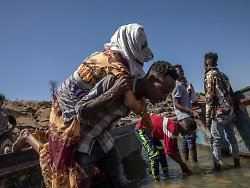Saturday 12th December 2020
Cut off from the rest of the world
Aid convoy reaches the Ethiopian crisis region
At the beginning of November, the Ethiopian head of government sends troops to the breakaway region of Tigray. Since then the fighting has continued. Humanitarian organizations have no access, thousands of people cannot be supplied. The first international aid delivery is now arriving.
For the first time since the beginning of the Ethiopian military offensive in Tigray, a convoy with international aid supplies has reached the disputed region. As the International Committee of the Red Cross (ICRC) announced, the delivery was organized in coordination with the Ethiopian authorities. The Ethiopian Red Cross also took part.
The convoy reportedly consisted of seven trucks carrying medicines and medical equipment for the treatment of more than 400 people in the regional capital of Mekele. The aid delivery will benefit the capital city hospital, the regional health department and the pharmacy of the Ethiopian Red Cross.
The hospital had to close its intensive care unit and operating room because the medical equipment and fuel for the generators ran out. At the same time, doctors had to treat more and more injured people at the end of November.
Humanitarian access has been called for for weeks
"This medical aid convoy will help replenish supplies, help patients and reduce the number of difficult life and death decisions," said ICRC Regional Director for Africa Patrick Youssef. According to the ICRC, the delivery also included blankets, clothing, cooking utensils and soap for around 100 families.
The international community had been calling for humanitarian access to the crisis region for weeks, which had been practically cut off from the rest of the world since the beginning of the conflict in early November.
At the beginning of December, the UN announced that it had reached an agreement with the Ethiopian government that guaranteed "unconditional access for humanitarian aid". The agreement failed, however, as Addis Ababa insisted on keeping the lead on the matter. The Ethiopian government appears to want to prevent outsiders from playing a leading role in the relief effort.
Around 100,000 people in refugee camps
On Friday evening, the UN expressed growing concern about the plight of Eritrean refugees in Tigray. She requested urgent access to around 100,000 people in four refugee camps. The UN Refugee Agency said it had received "an overwhelming number of worrying reports" of Eritrean refugees in Tigray who had been killed or kidnapped and brought back to Eritrea by force.
The Ethiopian Prime Minister Abiy Ahmed sent troops to the breakaway region of Tigray in the north of the country in early November. At the end of November he announced the capture of the regional capital Mekele. However, the TPLF, the People's Liberation Front that has ruled Tigray so far, announced that it would continue the fight.
According to estimates by the International Crisis Group, which specializes in conflicts, several thousand people have so far been killed in the fighting in Ethiopia. Almost 50,000 fled to Sudan.
. (tagsToTranslate) Politics (t) Ethiopia (t) Military operations
